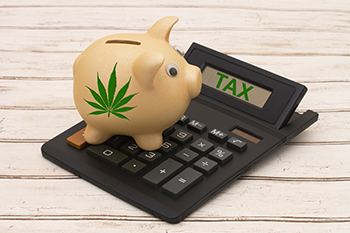Deduct Non-Marijuana Entity Business Expenses
 Although §280E prohibits cannabis growers and retailers from claiming deductions “for any amount paid or incurred during the taxable year in carrying on any trade or business….”, there are two common approaches to minimizing the impact of this harsh provision. First, taxpayers should seek to maximize Cost of Goods Sold (COGS) as deducting COGS is not prohibited by §280E. Secondly (and this is not an either/or choice), cannabis companies can seek to maximize deductible business expenses by allocating expenses to a SEPARATE non-marijuana business.
Although §280E prohibits cannabis growers and retailers from claiming deductions “for any amount paid or incurred during the taxable year in carrying on any trade or business….”, there are two common approaches to minimizing the impact of this harsh provision. First, taxpayers should seek to maximize Cost of Goods Sold (COGS) as deducting COGS is not prohibited by §280E. Secondly (and this is not an either/or choice), cannabis companies can seek to maximize deductible business expenses by allocating expenses to a SEPARATE non-marijuana business.
The second strategy is the more problematic approach for most cannabis companies as the IRS and the Tax Court has instituted a high threshold for what will constitute a separate (and non-cannabis) line of business. For cases where the seminal case in which the taxpayer came out on top see Caregiving Californians Helping to Alleviate Med. Problems, Inc. v. Commissioner . For cases where the taxpayer lost, see Alterman, Laurel, et vir. v. Commissioner and Olive v. Commissioner . Despite the losses, the “second-line-of-business” approach has not been foreclosed. The key remains providing sufficient evidence proving demonstrably separate activities and supporting the allocation of expenses.
The evidence relies on issues of fact that depends on, among other things, the degree of economic interrelationship between the two activities. The facts must provide a reasonable basis of expenses attributable to that entity (this presumes the separate activities are conducted via separate legal entities which is strongly recommended).
Non-Reasonable Basis
- Don’t use a single checking account for both entities.
- Don’t use the same credit card for both entities.
- Don’t rely on the verbal testimony as a source of fact that will define the different business entity.
- Don’t rely on bank/credit card statements to provide enough detail to allow for the deduction of expenses.
- Don’t assume your accountant is keeping adequate records of each purchase or expense.
Reasonable Basis
- Identify specific payments or expenses to the appropriate entity by: accounting book, and a log/ledger record.
- Provide separate documentary evidence by category: Keep detailed receipts, invoices, paid bills, or similar evidence with detailed citations of company name, description, and product category.
- Use proper inventory accounting method and keep a physical count of product categories.
- Keep separate ledgers for W-2 wage employees detailing the work performed to the appropriate business entity.
- Review the accuracy of all documentary evidence given to your accountant. The IRS holds you responsible for giving adequate detailed information.
1 Californians Helping to Alleviate Med. Problems, Inc. v. Commissioner (CHAMP), 128 T.C. 173, 183 (2007)
2 Alterman, Laurel, et vir. v. Commissioner, TC Memo 2018-83, (2018)
3 Olive v. Commissioner, 139 T.C. 19 (2012), aff’d, 792 F.3d 1146 [116 AFTR 2d 2015-5150] (9th Cir. 2015)

